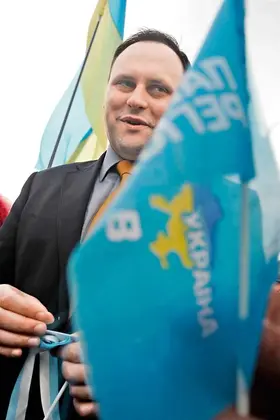In late 2004, Vladyslav Kaskiv played a major role in organizing the Orange Revolution, a popular uprising against the presidential vote rigged for Viktor Yanukovych.
Now, however, Kaskiv is working as a top official for his old nemesis, Yanukovych, the beneficiary of the 2004 rigged election that Kaskiv worked so hard to overturn.
JOIN US ON TELEGRAM
Follow our coverage of the war on the @Kyivpost_official.
Back then, Kaskiv headed the grassroots Pora youth movement. In the first days of the revolution, the pro-democracy group swiftly set up tents along Kyiv’s main street. Their actions inspired millions of Ukrainians. Facing mounting public pressure, the Ukrainian Supreme Court cancelled the fraudulent vote, leading to Viktor Yushchenko’s victory in a repeat election on Dec. 26, 2004.
Kaskiv today advises Yanukovych and heads the State Agency for Investment and National Projects Management. The agency seeks investment for strategic projects, but many opposition politicians question its transparency.
Meanwhile, many of Kaskiv’s former colleagues from Pora see Ukraine under Yanukovych moving in an undemocratic direction again. They point the blame on Yanukovych and see Kaskiv as betraying Orange Revolution principles.
In this Kyiv Post interview, Kaskiv explained why he is today not siding with a new wave of activists in defense of democracy, opting instead to work in Yanukovych’s administration.
Kyiv Post: There are several grassroots pro-democracy groups currently organizing mass protests, similarly to what you did 6-7 years ago as leader of the Pora student movement. Why are you not, this time, on the same side of the barricades?
Vladyslav Kaskiv: There are two natures at the core of any protest and what is called a revolution – either to fight “for” or “against” something. All this creates a fundamentally different motivation for participants. It generally combines a fundamentally different environment and, thus, creates different results. Unlike in 2004, the fight today is more “against” something and is motivated by mercantile interests. In 2004 the struggle was “for” – for a better future and life. In fact, the year of 2004 was the completion and culmination of the post-Soviet transition period.
KP: But activists are again planning massive protests, and they say the reason is the same as in 2004: that democracy in Ukraine is under threat. Back in 2004, you also believed that democracy was under threat. Do you share the view of those organizing the protests now?
VK: I am now engaged in my professional activities. I think that’s the most important thing I can do for Ukraine now. I believe that poverty is slavery. And a democratic society can never be poor. So now I’m working on solving this.
KP: What advice could you as a former protest leader give, if any, to today’s protest organizers?
VK: They should carefully think about what goals they are pursuing. Moreover, they should declare their patriotism and high goals for the whole of Ukraine as a state.
KP: What goals would you advise them to declare and defend, and how could they achieve this?
VK: I think the key objective for Ukraine is attaining competitiveness in a global world which is in crisis and dynamically changing. We need to be strong, have a clear strategy and work very fast to survive and make progress. This requires unity as a nation in our efforts.
KP: When visiting Kyiv on Jan. 10-11, European Commissioner for Enlargement and Neighborhood policy Stefan Fuele warned Ukrainian officials that without democracy Ukraine cannot move to Europe.
VK: That’s true. Who denies it? The question is, however: who are the representatives of democracy today? I think that the old opposition is too discredited. Only new ideas and an ambitious new generation can make the country democratic.
KP: But the current authorities are always responsible for the state of democracy in a country…
VK: In Ukraine, a totalitarian regime is not possible in principle.
KP: But in your opinion, is democracy in Ukraine now under threat?
VK: Such a threat exists in any country, even in the U.S. There are always those who want more control and those who oppose this. The more important question is: How strong are state institutions and public understanding of the priorities facing society?
KP: Should one worry about democracy in Ukraine?
VK: One should always worry [about democracy] and be ready to defend it. But I would like to emphasize that poor societies are rarely democratic.
KP: So, you now see the fighting poverty as a big step towards preserving democracy?
VK: I think these things are interdependent. If a person is in a state where he or she is wondering where to get their next loaf of bread, they are not likely to be thinking much about democracy. … But these processes should be occurring in parallel to one another. The more economically developed a society is, the more democratic it is likely to be.
Kyiv Post staff writer Yuriy Onyshkiv can be reached at onyshkiv@kyivpost.com
You can also highlight the text and press Ctrl + Enter




